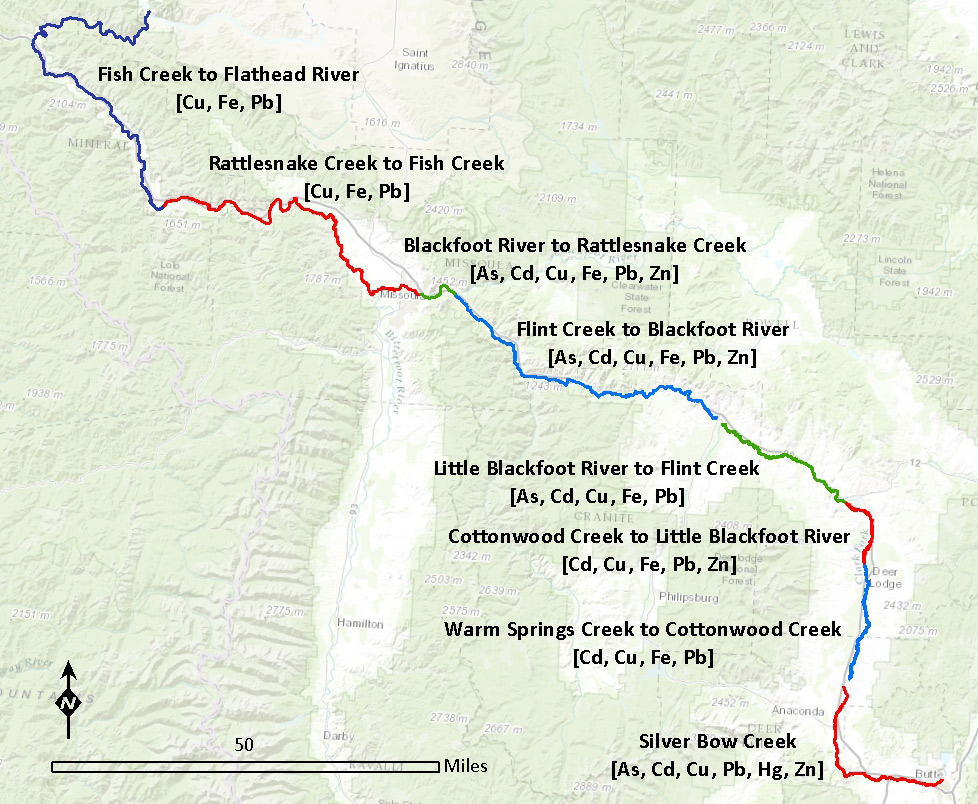Additional Information

The Montana Department of Environmental Quality has determined the Clark Fork River (where UM’s storm water directly discharges into) is an “impaired” water body because it does not meet Montana water quality standards, mostly due to the mining activity that has occurred in its watershed. Pollutants of concern in our section of the river (see above map) are copper, iron and lead. Many in our campus community enjoy recreating in and around the Clark Fork. From summer floats, to fishing and boating, maintaining a healthy river not only benefits Missoulians, but also our iconic wildlife. Ospreys and bald eagles fish these waters and bears, beavers, otters, waterfowl and deer all rely on a healthy ecosystem. And not just the wildlife, but also our precious canine friends who frolic and quench their thirst in the Clark Fork. It behooves all of us to strive to keep our beloved river as clean as possible. Pollutants carried by stormwater is the #1 source of contamination of rivers, lakes and streams. Here’s how you can do your part.
Lawn and Garden Care
- The chemicals contained in fertilizers, pesticides and herbicides can easily contaminate storm water if not carefully applied. Follow manufacturers’ suggestions and keep these chemicals off pavements and streets.
- Use mulch lawn mowers - these provide natural nutrients and help grasses retain moisture
- Maintain turf grass at a 3” height. Experts believe this provides the optimal development of a deep root structure that requires less watering and nutrients
- If you must fertilize, do it in the Fall season.
- Use native plants and grasses – these species need less water and maintenance while still providing abundant beauty. Here’s a link to the Montana Native Plant Society.
- Use permeable pavers to help absorb storm water runoff.
- Don’t overwater the lawn. This can cause runoff into drains and wastes resources.
- Here’s a Video on best management practices
Leaf and Grass Debris
- Missoula provides for pick-up of fallen leaves in November. It is only during this pick-up period that leaves should be swept into the street. At other times, keep leaves out of the street. Dead leaves can be composted.
- Mulch mowers process grass clippings so that they can be left on the lawn to recycle nutrients and conserve water. If you do remove grass clippings, keep them off hardscapes. Grass can be used in compost bins to create a rich humus that’s wonderful for gardens.
- Check out this video for guidance on composting.
- Here are some EPA recommendations:
Pet Waste
- Dog waste is a major contributor to pollution of surface waters.
- Be a good and courteous neighbor by always cleaning-up after your pet. Be sure to always pack a poop bag (or two) on walks with Fido.
- Be extra vigilant when exercising Fido along the river.
- Please – PLEASE – put the bag of poop in the trash! Do not leave it on the side of the trail as some Missoulians insist on doing.
Car Washing
- Use a commercial car wash as the waste water drains to the sanitary sewer
- Wash a car on a pervious surface such as grass, so wash water can filter into the ground.
- Keep the wash water away from storm water drains.
- Use a hose attachment with a trigger so that excess water doesn't run off into drains. It also saves on water resources.
- If you support the charity car washes that are a common sight during summers in Missoula, check to be sure that the organization is using the Clean Suds Car Wash kit that is available for free from the Missoula Valley Water Quality District.
